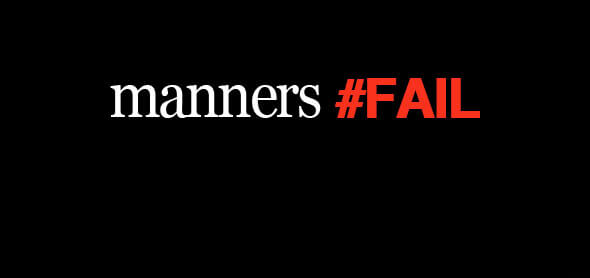 By Sue Duris
By Sue Duris
I had a discussion recently about online relationship building.
The gist of the discussion: With the rise of social media, the rules of relationship building with journalists (or anyone, really) have not really changed, but people often get bold pitching.
Has social media made us so lazy that we have forgotten the rules about good etiquette?
It’s a great time to, as Stephen Covey pointed out, “sharpen the saw.”
So how can we sharpen our relationship building skills with journalists?
Relationship Building 101: Mind Your Manners
There’s No Golden Ticket
Social media is not your golden ticket to a journalist. There are no shortcuts in life, and that definitely applies to relationship building.
Yes, thanks to the openness of social media, it’s easier to reach out and touch someone.
I’ve been able to engage with people I never thought I would ever have the opportunity to, but with that access comes responsibility.
We can communicate with people, including journalists, but that doesn’t mean the common rules of courtesy do not apply.
Send a clear message that you care about the relationship by starting on the right foot, being courteous, and showing respect.
Relationships with journalists aren’t sprints nor marathons, but journeys.
They are long-term investments that must be nurtured.
Show Them You Care
After you have researched the journalists (remember to add bloggers to this list and treat them with the same courtesy you would treat a traditional journalist – journalism has morphed into a much wider ecosphere) you want to develop relationships with, ask yourself some questions:
- Are you listening to them?
- What are their passions?
- What are their likes and dislikes?
- What is their preferred method of communication?
Many relationships tend to start out as a social connection and then after building on that, evolve into a business relationship.
Case in point: I work with a lot of tech journalists. I discuss restaurants with one, and TV and film with another. That’s how our relationship started and grew. But both of these journalists wanted to be communicated with via email on the tech-related items they write about.
Get to know them beyond their writing and when it is time to pitch them, do it in the manner they want. When you engage with them, be genuine. They will remember that later.
Walk in Their Shoes
I get it. You have a great product. You need to build buzz for it. But pitching The Wrap when TechCrunch is a better fit is really a complete waste of the journalist’s and your time.
And worse, that faux pas may have just left a bad taste in the journalist’s mouth regarding working with you later.
This could cost you down the road.
An extreme example, but you get my point.
It helps to look at things through the journalist’s eyes. A journalist is writing for an audience. They need to continually provide content to this audience that is compelling and resonates with them. Why else would they continue to read?
Journalists are salespeople, too. They are trying to get eyeballs on their product – whether it is a blog or media outlet – and they need content to help them.
We need them, and they need us.
Helping them now will earn you points for the future.
Help Me Help You
That scene in Jerry Maguire where Tom Cruise utters those magic words to Cuba Gooding, Jr. is important here.
Researching the journalist and following them on social media are your guides.
They ask a question, and you are right there with the answer that helps them.
Do you have information for them? Do you know someone who they can interview that will answer their questions?
Journalists are on tight deadlines.
Respond quickly.
Just being at the right place at the right time to help them will help you.
Reap What You Sow
Helping a journalist now will send a message to them you are to be trusted, you are thoughtful and sincere, and you get them. They will help you out when the opportunity is there.
And, remember, when they do write about you, the story doesn’t end there. Keep your eye on building that relationship and rewards will follow.
Sharpening your relationship building skills is like polishing a diamond. The work will lead to the reward, and you’ll shine brighter.